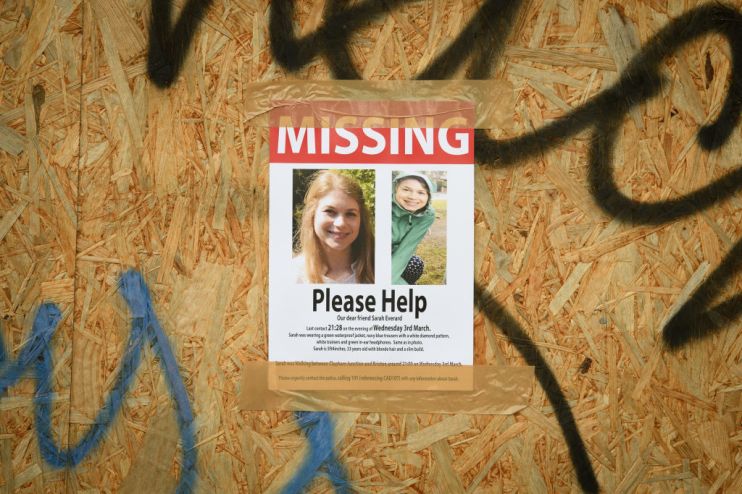To stop women like Sarah Everard going missing, the conversation must start with men

When I was at school, probably around 16-years-old, I was told not to have my hair in a ponytail if I was walking home at night.
Potential attackers will likely be drawn in by a hairstyle which is easier to grab, I was told, by a male coach brought in to talk to us about what to do if we were attacked and how to avoid being attacked in the first place.
Plaits were out of the question, he joked, that’s basically a rope pulling you into your attacker.
If someone grabs you from behind, stomp on the middle arch of their foot and when they flinch, elbow them in the stomach. If you’re facing them, knee them in the groin.
You get the picture.
I saw Sarah Everard’s face for the first time on my Instagram stories over the weekend where people were sharing it, desperate to find her. Please, god, let them find her, was my first thought, let her turn up, saying this was all a huge misunderstanding.
Sarah’s disappearance is tragic on a personal level, for her friends, her family, but also for every woman who has had to change her hair to make herself less of a target.
On the other side of the world, another story has been playing out.
A young woman who went to the same school as me in Sydney, Australia launched a petition for teenagers to be taught meaningfully about consent. Women, and a handful of men, of all ages piled in to tell their stories of rape or assault while they were teenagers or recent graduates from Sydney schools.
The comments were eerie: “I didn’t know it was rape until later”, “I thought it was normal”, “He was my boyfriend, so I thought it was fine”.
Also in the backdrop, were a string of allegations of rape and sexual assault of all kinds from staffers and politicians in the Australian Parliament. Following the story of Brittany Higgins, who was allegedly raped in a Cabinet minister’s office, Australian PM Scott Morrison went home and had a chat with his wife, who apparently said something along the lines of, “what if this was your daughter?”. Only then did the penny drop: this was bad.
Westminster, we know, is no safe haven for women. The notorious sex pest scandal in 2017 has been followed by a steady stream of stories of specific incidents of sexual assault and an insidious culture of misogyny, which nourishes more serious wrongdoing.
But the response to the stories of rape and sexual assault in Sydney schools was incredibly telling.
Many of the local girls’ schools vowed to put together curriculums to better arm girls with knowledge of consent.
One of the schools said it would teach its students about the impacts of “risk taking” and “alcohol”. Again, the same old tired myth: if we just teach girls to keep themselves safe, they won’t be attacked.
On the other hand, the headmaster of the local boys’ schools said: “It is a wake-up call for us all”.
But this is not a wake-up call. It is an age old story. Women just like Sarah Everard go missing regularly.
We’ve heard it all. We tell these stories again and again and yet, they continue to happen.
Many women I know are horrified by her disappearance, but they are not shocked. The men I’ve spoken to on the other hand, if they have heard about it or taken note of it, are shocked. In Clapham, of all places, one joked to me.
A simple flick through the people who have written about Sarah on Twitter will give you a flavour of the problem, almost all of them are from women.
If these conversations aren’t happening to men from their male friends, nothing will change. If boys aren’t taught that trying to convince someone to have sex is coercion or that if a girl is too drunk, they can’t consent, nothing will change.
Yes, this is about teaching consent in schools, but it is also a radical culture shift from delineating sexual harassment and assault as primarily “women’s issues” which are fought for by women.
Formal education is only part of the equation, but the more monumental shift will be when stories like Sarah’s are brought up in casual conversations. Otherwise it’s too easily brushed off with a “yes, yes, I know miss”. Unless men see Sarah Everard’s face on their Instagram on a Sunday night and carry around the same pit in their stomach as the horrible details drip out, education won’t have done its job.
This is the same for almost all social revolutions, if only trans people speak up about the issues they face, if only black people attend Black Lives Matter rallies, if only women write columns like this one, change, if at all, will be painfully slow.
In the meantime, more women like Sarah Everard will go missing.
